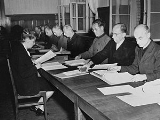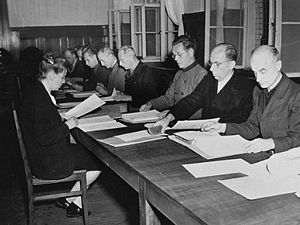
RuSHA Trial
Encyclopedia

War crime
War crimes are serious violations of the laws applicable in armed conflict giving rise to individual criminal responsibility...
s the U.S. authorities held in their occupation zone in Germany
Germany
Germany , officially the Federal Republic of Germany , is a federal parliamentary republic in Europe. The country consists of 16 states while the capital and largest city is Berlin. Germany covers an area of 357,021 km2 and has a largely temperate seasonal climate...
in Nuremberg
Nuremberg
Nuremberg[p] is a city in the German state of Bavaria, in the administrative region of Middle Franconia. Situated on the Pegnitz river and the Rhine–Main–Danube Canal, it is located about north of Munich and is Franconia's largest city. The population is 505,664...
after the end of World War II
World War II
World War II, or the Second World War , was a global conflict lasting from 1939 to 1945, involving most of the world's nations—including all of the great powers—eventually forming two opposing military alliances: the Allies and the Axis...
. These twelve trials were all held before U.S. military courts, not before the International Military Tribunal, but took place in the same rooms at the Palace of Justice. The twelve U.S. trials are collectively known as the "Subsequent Nuremberg Trials
Subsequent Nuremberg Trials
The Subsequent Nuremberg Trials were a series of twelve U.S...
" or, more formally, as the "Trials of War Criminals before the Nuremberg Military Tribunals" (NMT).
In the RuSHA Trial, the 14 defendants were all officials of various SS organizations responsible for the implementation of the Nazi "pure race" programme: the Rasse- und Siedlungshauptamt (RuSHA)
RuSHA
The Rasse- und Siedlungshauptamt-SS , , was the organization responsible for "safeguarding the racial 'purity' of the SS" within Nazi Germany....
, the office of the Reich Commissioner for the Strengthening of Germanism (Reichskommissar für die Festigung des deutschen Volkstums, RKFDV, a post held by Heinrich Himmler
Heinrich Himmler
Heinrich Luitpold Himmler was Reichsführer of the SS, a military commander, and a leading member of the Nazi Party. As Chief of the German Police and the Minister of the Interior from 1943, Himmler oversaw all internal and external police and security forces, including the Gestapo...
), the Repatriation Office for Ethnic Germans (Volksdeutsche Mittelstelle, VoMi), and the Lebensborn
Lebensborn
Lebensborn was a Nazi programme set up by SS leader Heinrich Himmler that provided maternity homes and financial assistance to the wives of SS members and to unmarried mothers, and also ran orphanages and relocation programmes for children.Initially set up in Germany in 1935, Lebensborn expanded...
society. The charges centered on these racial cleansing and resettlement activities.
The judges in this case, heard before Military Tribunal I, were Lee B. Wyatt (presiding judge), Associate Justice of the Supreme Court of Georgia; Daniel T. O'Connell of the Superior Court of Massachusetts
Massachusetts Supreme Judicial Court
The Massachusetts Supreme Judicial Court is the highest court in the Commonwealth of Massachusetts. The SJC has the distinction of being the oldest continuously functioning appellate court in the Western Hemisphere.-History:...
, and Johnson T. Crawford
Johnson T. Crawford
Johnson Tal Crawford was a district judge in Pontotoc County, Oklahoma, United States. He was a member of the Military Tribunal which conducted the Nazi War Crimes Trials at Nuremberg. His papers are held in the Linscheid Library of East Central University....
from Oklahoma
Oklahoma
Oklahoma is a state located in the South Central region of the United States of America. With an estimated 3,751,351 residents as of the 2010 census and a land area of 68,667 square miles , Oklahoma is the 28th most populous and 20th-largest state...
. The Chief of Counsel for the Prosecution was Telford Taylor
Telford Taylor
Telford Taylor was an American lawyer best known for his role in the Counsel for the Prosecution at the Nuremberg Trials after World War II, his opposition to Senator Joseph McCarthy in the 1950s, and his outspoken criticism of U.S...
. The indictment
Indictment
An indictment , in the common-law legal system, is a formal accusation that a person has committed a crime. In jurisdictions that maintain the concept of felonies, the serious criminal offence is a felony; jurisdictions that lack the concept of felonies often use that of an indictable offence—an...
was served on July 7, 1947; the trial lasted from October 20, 1947 until March 10, 1948.
Indictment
- Crimes against humanity by implementing "racial purity" programmes by kidnapping children, forcing "non-AryanAryan raceThe Aryan race is a concept historically influential in Western culture in the period of the late 19th century and early 20th century. It derives from the idea that the original speakers of the Indo-European languages and their descendants up to the present day constitute a distinctive race or...
" pregnant women to undergo abortions, plundering, deportation of populations from their native lands in occupied countries and resettling of so-called "ethnic Germans" (Volksdeutsche) on such lands, sending people who had had "interracial" sexual relationships to concentration camps, and general participation in the persecution of Jews. - War crimes for the same reasons.
- Membership of a criminal organization, the SSSchutzstaffelThe Schutzstaffel |Sig runes]]) was a major paramilitary organization under Adolf Hitler and the Nazi Party. Built upon the Nazi ideology, the SS under Heinrich Himmler's command was responsible for many of the crimes against humanity during World War II...
.
All defendants were indicted on counts 1 and 2. Inge Viermetz was excluded from count 3. All defendants pleaded "not guilty".
Defendants
| Name | Function | Charges | Sentence | ||
|---|---|---|---|---|---|
| 1 | 2 | 3 | |||
| Ulrich Greifelt Ulrich Greifelt Ulrich Heinrich Emil Richard Greifelt was an officer of the Schutzstaffel during the Nazi regime in Germany. He was found guilty of war crimes at Nuremberg and died in Landsberg Prison.-Biography:Greifelt was born in Berlin in 1896, the son of a pharmacist... |
Chief of Staff of RKFDV | G | G | G | lifetime imprisonment; died 1949 |
| Rudolf Creutz | Deputy to Greifelt | G | G | G | 15 years; released 1955-died 1970 |
| Konrad Meyer-Hetling | Office head in RKFDV | I | I | G | Time already served (since May 27, 1945); released after the judgment; died 1973 |
| Otto Schwarzenberger | Office head in RKFDV | I | I | G | Time already served (since May 2, 1945); released after the judgment |
| Herbert Hübner | Chief of Poznań Poznan Poznań is a city on the Warta river in west-central Poland, with a population of 556,022 in June 2009. It is among the oldest cities in Poland, and was one of the most important centres in the early Polish state, whose first rulers were buried at Poznań's cathedral. It is sometimes claimed to be... office of RKFDV and representative of RuSHA in western Poland Poland Poland , officially the Republic of Poland , is a country in Central Europe bordered by Germany to the west; the Czech Republic and Slovakia to the south; Ukraine, Belarus and Lithuania to the east; and the Baltic Sea and Kaliningrad Oblast, a Russian exclave, to the north... |
G | G | G | 15 years; released 1951 |
| Werner Lorenz Werner Lorenz Werner Lorenz was SS head of the Hauptamt Volksdeutsche Mittelstelle an organization charged with settling ethnic Germans in the German Reich from other parts of Europe.-Early life:... |
Head of VoMi | G | G | G | 20 years; released 1955-died 1974 |
| Heinz Brückner | Office head at VoMi | G | G | G | 15 years; released 1951 |
| Otto Hofmann Otto Hofmann Otto Hofmann was an Austrian SS-Gruppenführer and an official of Nazi Germany's "Race and Settlement Main Office".-Early life:Hofmann was born in Innsbruck, Tyrol. He served as a military pilot in World War I... |
Head of RuSHA until April 20, 1943, later head of the SS in southwestern Germany |
G | G | G | 25 years; released 1954 died 1982 |
| Richard Hildebrandt Richard Hildebrandt Richard Hermann Hildebrandt was a politician in Nazi Germany and member of the Reichstag, and an SS-Obergruppenführer. From 1943 until his capture in 1945, he led the SS-Rasse und Siedlungshauptamt , the Office of Race and Settlement of the SS... |
Head of RuSHA, Hofmann's successor | G | G | G | 25 years; died 1952 |
| Fritz Schwalm | Chief of Staff of RuSHA and head of the "Immigration Office" (Einwandererzentrale, EWZ) in Łódź |
G | G | G | 10 years;released 1951 |
| Max Sollmann | Head of the Lebensborn Lebensborn Lebensborn was a Nazi programme set up by SS leader Heinrich Himmler that provided maternity homes and financial assistance to the wives of SS members and to unmarried mothers, and also ran orphanages and relocation programmes for children.Initially set up in Germany in 1935, Lebensborn expanded... society |
I | I | G | Time already served (since July 6, 1945); released after the judgment |
| Gregor Ebner | Head of Health Dept. of Lebensborn | I | I | G | Time already served (since July 5, 1945); released after the judgment; died 1974 |
| Günther Tesch | Head of Legal Dept. of Lebensborn | I | I | G | Time already served (since May 13, 1945); released after the judgment |
| Inge Viermetz | Deputy to Sollmann | I | I | acquitted | |
I — Indicted G — Indicted and found guilty
The four Lebensborn members were not found guilty on counts 1 and 2 of the indictment. The tribunal considered the Lebensborn society not responsible for the kidnapping of children, which was carried out by others.
Greifelt died in the Landsberg
Landsberg Prison
Landsberg Prison is a penal facility located in the town of Landsberg am Lech in the southwest of the German state of Bavaria, about west of Munich and south of Augsburg....
prison on February 6, 1949. Hildebrandt was turned over to Polish
Poland
Poland , officially the Republic of Poland , is a country in Central Europe bordered by Germany to the west; the Czech Republic and Slovakia to the south; Ukraine, Belarus and Lithuania to the east; and the Baltic Sea and Kaliningrad Oblast, a Russian exclave, to the north...
authorities. He was put on trial for war crimes again in Poland and sentenced to death. He was hanged on March 10, 1952. Hübner, Brückner, and Schwalm were released in 1951. Also in that year, the sentences of Hofmann and Lorenz were reduced to 15 years, and that of Creutz to 10 years. Hofmann was released in 1954.
External links
- Trial proceedings from the Mazal Library.
- Description from the U.S. Holocaust Memorial Museum.
- Notes on the trial.
- Lebensborn (in German).

